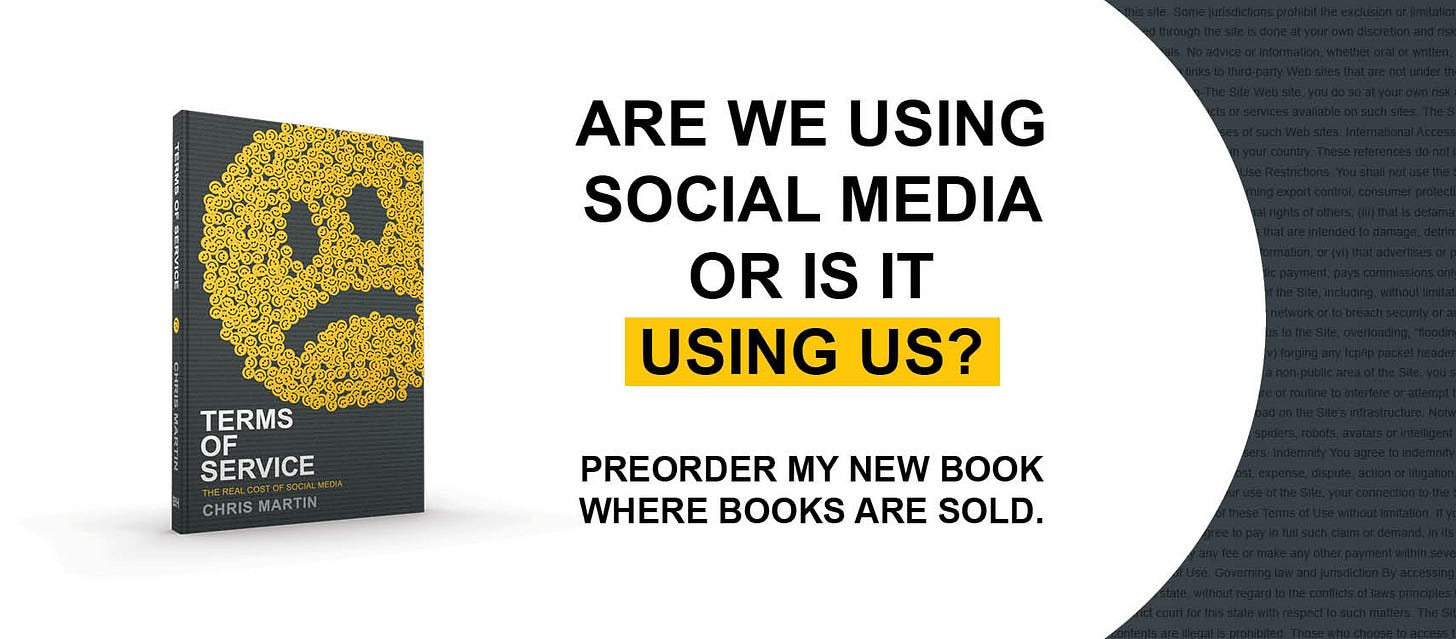The Hope in Our Developing Digital Dystopia
Things are bad, but it's going to be okay.
I am not, by nature, a very trusting, optimistic person, especially when it comes to the social internet matters about which I write here. I am a pretty skeptical person and I don’t build trust of others easily, which can unfortunately lead me to be sinfully cynical.
However, even setting my skepticism and cynicism aside, the last couple of years in the realm of the social internet have been pretty gloomy. When one looks at what the broad landscape of the social internet looked like in 2019 compared to what it looks like now, there is little to celebrate.
Division and polarization have only become more dominant.
Our ability to discern truth from fiction does not appear to have developed much.1
Who we are on the internet continues to become more important to many of us than we are off of the internet, as demonstrated by our unrelenting investment in digital relationships and assets above that which is offline.
We continue to freely share personal information and troves of sensitive data with companies like Facebook/Meta who have shown more interest in profiting from user data than protecting it.
Even some of my most optimistic friends recognize the present dystopia of the social internet, which has helped me as I grapple with whether or not my current concern is just fruit of my sinful heart. It doesn’t appear to be just me and my own broken brain—things really do seem to be as bad as I see them, at least this time around.
Amid such a developing digital dystopia, though, my heart hurts, my head spins, but my soul is not crushed. Things are bad, and the future of our internet-infused lives is dark, but it’s going to be okay.
It’s easy to think of life as a book. Our birth is at the beginning of the book, the climactic events of early-middle-age like getting married and becoming a parent are somewhere close to the middle of the book, and the waning years of our lives are the final chapters of the book. Eternity, if we believe in it, is a sort of epilogue to the life we’ve lived.2
When we look at our lives this way, we are mistaken.
In the grand scheme of human existence, if we want to contain our lives to a single volume, our life on earth is merely the introduction to an eternal tome of everlasting life, either with or apart from God.
When I am tempted to despair at the developing digital dystopia that will hang over the rest of our lives, I am reminded that my hope rests in both the completed past action of Jesus Christ and the untouchable promises of future fellowship with my God in eternity.
What an amazing grace it is to be able to cling to both the past and the future when the present feels so precarious.
Whether you fear some sort of government-initiated, Orwellian surveillance state in which everything you post and search on the internet is observed and used to determine your standing before the authorities or you fear a more realistic future of capitalism-fueled surveillance in which we, like Huxley postulated, are destroyed by that which we love, let your fears of what is to come in the next few decades be soothed by what is to come in the next few millennia and what happened a couple millennia ago.
It is easy, at least for me, to be discouraged by so much of the fruit that has sprouted from our ever-deepening relationship with the social internet, especially when such fruit is touted as “progress.” If, perhaps, you find yourself feeling the kind of despair I do, take heart. The artificial intelligence and algorithms and data-sharing and other forms of technological development that are called “progress” may be where some find hope for the future of humanity, but they are not where we find our hope, if you trust in Christ as Savior.
Our hope, by the grace of God, is rooted in the unshakeable finished work and future promises of Christ, not the derivative works of a broken creation. In this we can rejoice.
Praise God for his provision and for the hope he gives us.
See: anything related to bogus coronavirus folk remedies or vaccine conspiracy theories.
I’m pretty sure I didn’t come up with this illustration, but for the life of me I cannot figure out where I first heard it. It’s probably C. S. Lewis. I just can’t find the source of this idea. Know that I don’t claim to have invented it. :-)




Thanks! Deep thoughts here. Our hope, by the grace of God, is rooted in the unshakeable finished work and future promises of Christ, not the derivative works of a broken creation. In this we can rejoice.
This is a good encouragement. Congrats on the book! I am looking forward to reading it.
Could it be that your "epilogue" idea is from the last chapter of The Last Battle? "All their life in this world and all their adventures had only been the cover and the title page: now at last they were beginning Chapter One of the Great Story which no one on earth has read: which goes on for ever: in which every chapter is better than the one before."